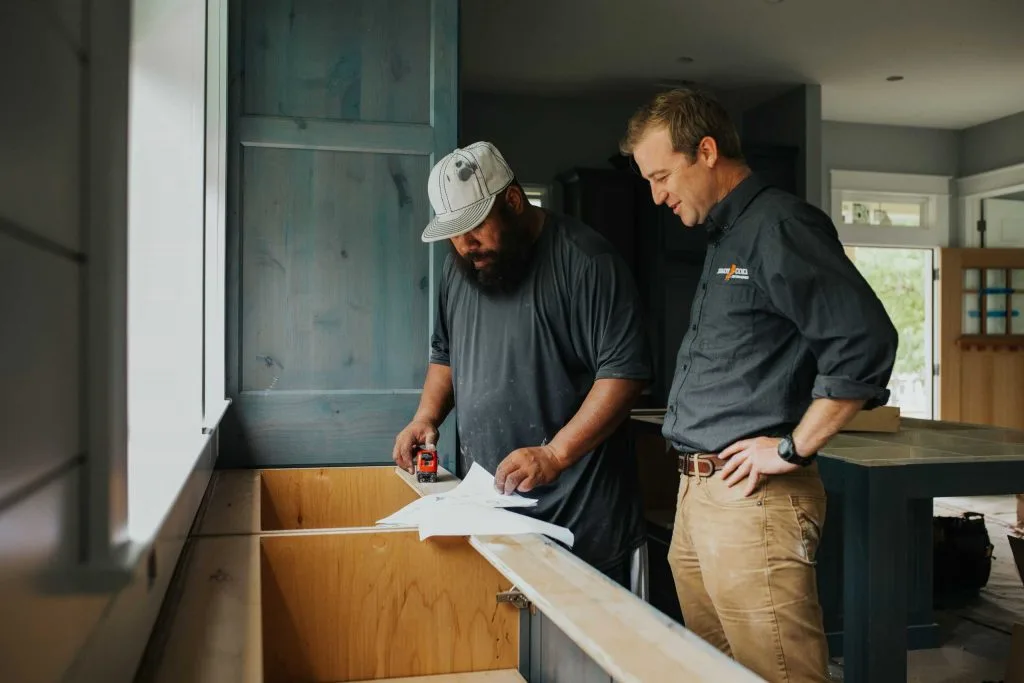
Do you dream of turning empty lots into beautiful homes? Of helping people bring their dreams to life, embodied through captivating craftsmanship? The custom home building industry might be the niche you’re searching for. It’s a satisfying enterprise that allows entrepreneurs to meld creativity with craftsmanship to meet the growing demand for personalized housing.
And if you’re ready to start your own business in custom home building You’re in the right place. While creating a successful home-building company from the ground up can be fulfilling and incredibly profitable, it requires careful planning and preparation.
This 10-step guide walks you through how a homebuilder should go about laying the foundation for their business, starting with gaining industry experience and ending with professional software designed to grow with you.
Follow Our Guide to Start a Successful Home Building Company
- 1. Gain Experience and Industry Knowledge
- 2. Develop a Comprehensive Business Plan
- 3. Secure Licenses and Certifications
- 4. Choose the Right Business Structure
- 5. Plan Your Financing Strategy
- 6. Build a Reliable Network of Subcontractors and Suppliers
- 7. Invest in Essential Equipment and Tools
- 8. Create a Strong Online Presence
- 9. Set Up Your Office and Administrative Systems
- 10. Launch Your Business and Build a Portfolio
- Scale With Custom Home Building Management Software
How to Start Your Custom Home–Building Business
It’s quite a process to build up a custom home-building business, but in the end, it is well worth the result. Some of the steps, such as licensing and certification, vary from state to state, but generally, the gist remains the same.
Here’s how to start a custom home-building company:
1. Gain Experience and Industry Knowledge
First things first, you need to gain actual construction experience and industry knowledge. It’s tough to succeed in an industry you’re completely unfamiliar with. So, before entering into entrepreneurship, get involved in home building by working with an established construction business or builder. This will give you the experience you need surrounding construction, business operations project management, and client interactions.
Industry-specific workshops or courses on residential construction and business management through resources like NAHB Education are good options, too. Certification programs, like OSHA safety training, are worthwhile, too, since they’ll help you familiarize yourself with industry safety standards. These add to your background, setting the groundwork for your future business.
While this experience will help you successfully run a home-building business, it also can help you understand your future employees’ perspectives. Working in the field under a successful home builder or construction company gives you valuable experience, helping you create a business that attracts and values experienced, qualified, and reliable people.
2. Develop a Comprehensive Business Plan
A solid business plan for a home builder is the backbone of any successful custom home-building enterprise. So, before you get too carried away with dreams of building big, beautiful houses that ooze personality and charm, take a pit stop at the business-plan-developing station.
Include your mission, vision, and objective statements concerning your unique selling points, such as sustainable designs or high-tech homes. Create an elaborate, well-thought-out plan by asking yourself these questions:
- What is my business’s vision and mission?
- Who is my ideal customer, and what are their needs?
- What services will I offer, and what will set me apart from competitors?
- What is my startup budget, and how will I finance my business?
- How will I market my business and attract clients?
- What business structure and legal requirements will I need to address?
- How will I manage construction timelines, budgets, and client expectations?
- What is my long-term plan for growth and scaling?
This step takes time (we’ll talk about the big questions more later on), but it’s a crucial one. Creating a well-developed home builder business model goes a long way in streamlining the process and steering clear of avoidable roadblocks and headaches later on, so it’s well worth the time.
Plus, thinking it through gives you a chance to work out the kinks in your plans that you haven’t addressed in depth yet and rethink things you might be unsure about.
3. Secure Licenses and Certifications
Starting a custom home building business requires specific licenses to operate legally. The specifics vary from state to state but often include:
- A general contractor’s license, usually provided by the Contractor State License Board
- Local building permits, which ensure compliance with zoning laws and building codes
Failure to obtain these licenses can lead to hefty fees or even interruption of your business, so be sure to check with your local or state government’s licensing agency before opening your doors.
While you’re at it, look into insurance requirements in your state. These vary from state to state, but in general, you’ll need to be insured. For example, in Washington state, all construction contractors need to register with the state’s Labor and Industry Board (L&I) and must be bonded and insured.
It’s also not a bad idea to join industry organizations like the National Association of Home Builders (NAHB). This can help you gain credibility and open the door to networking opportunities.
As you grow, you may need to get additional licenses. For example, if you plan to work on huge, commercial-sized projects, you might need a commercial license. Again, like the other licenses, this particular requirement can vary from state to state.
4. Choose the Right Business Structure
Choosing the proper business structure is a must for liability protection and tax purposes. Custom home-building businesses most often work with the following:
- Limited Liability Company (LLC): Protects your personal assets from business liabilities.
- Corporation: Provides full liability protection but involves more paperwork.
- Sole proprietorship or partnership: Easier to set up but more risky for personal assets.
Consult with tax and legal experts to determine which business strategy option is best for your circumstances. If you want to learn more about each of the options, the IRS’ Guide to Business Structures is a helpful resource with detailed descriptions.
5. Plan Your Financing Strategy
Custom home companies demand sizable up-front investments. So, unless you’re prepared to fund the venture yourself, identify and secure funding through options such as a small business loan or investors. Each option has its merits, so you’ll have to choose what works best for your goals and needs.
At this point, it’s not a bad idea to figure out who your accountant will be. The accountant will help you stay compliant with taxes and inculcate excellent financial habits.
Cash management software is another thing to think about. Research cash flow management tools like Quickbooks (which can even be integrated into Housecall Pro’s management software for ultimate convenience). These will help you keep track of cash flow once you start your business.
6. Build a Reliable Network of Subcontractors and Suppliers
No custom home builder (or very few) flies 100% solo. A ton, and we mean a ton, of work, goes into building a custom home. Unless you’re an expert at all things electrical, HVAC, framing, concrete, and everything else, you’re going to need a network of construction workers and subcontractors.
Identify and develop a network of preferred subcontractors and suppliers in your area to ensure the quality and timely completion of jobs. These should include:
- Subcontractors, including plumbers, electricians, HVAC specialists, and other tradesmen with proven skills
- Reputable suppliers (the best ones offer quality materials at competitive prices)
Vet each partner thoroughly to ensure they meet the standards of safety, quality, and timeliness. Remember, the partners you choose will reflect in your reputation, craftsmanship, and quality, so choose wisely.
7. Invest in Essential Equipment and Tools
Running a custom home-building business requires various types of equipment. Of course, the specifics vary based on which portions of the build you plan to handle in-house, if any. Essentials you may need include:
- Vehicles and trailers for transporting materials and equipment
- Specialized tools, such as power tools, measurement instruments, and safety equipment that meet OSHA standards
- Project management software to streamline scheduling, estimating, and cost tracking
You can buy or lease construction vehicles, trailers, and specialized tools. In the early stages of your business, you might find that it works better to rent or lease what you need. Of course, you should do what works best—if buying works better, go for it.
Get In Touch: 858-842-5746
Let us earn your trust
On average, Pros increase monthly revenue generated through Housecall Pro by 50% after their first year.
See plan options and feature breakdown on our pricing page.
8. Create a Strong Online Presence
Your online presence is usually one of the first impressions potential clients will have about your business. It’s also how they’ll find and learn more about your business, especially after receiving a recommendation from a friend or family member.
How to Market Your Custom Home Building Projects
So, to ensure you’re findable, you need to have a strong online presence. This starts with creating a professional website and Google Business Profile (GBP). Your website should be a more detailed version of your Google Business Profile, featuring easy contact options, customer testimonials, and project portfolios. Your GBP should feature the basics, including business hours, contact options, and your location. Remember to update this as needed.
Once you have that setup, turn your focus to your social media and content marketing efforts. Create a business account on Facebook, Instagram, and other platforms where you can share videos of jobs you’re working on, share industry insights, and other content that boosts your online presence.
Local service pages are another excellent option to add to your website and overall marketing strategy. Create service pages for different locations, focusing on related keywords, such as “Custom Home Builder in Chattanooga, TN” or “Seattle Custom Home Builder.” Further improve your online presence with helpful blogs, such as the best places to build in a particular area, guides that explain the home building process, and so on.
Attend In-Person Networking & Local Trade Shows Events
Aside from the online game, in-person networking is a great way to get your business name out there. Networking with real estate agents and attending local trade shows can be a phenomenal way to let people know about your services and produce referrals.
9. Set Up Your Office and Administrative Systems
Your office is the home base for your business. It’s the control room where you manage the administrative, behind-the-scenes tasks of all your future custom home projects. It could be a home office or rented space—whatever works best for you.
At a minimum, your office should have:
- Hardware, including a computer, printer, and similar basic equipment
- Project management software to streamline operations
- CRM software to help manage client relationships efficiently
Having all of that ready to go before you launch your business will help things go much more smoothly. This way, you won’t be scrambling to find a computer to create an estimate or juggling a laundry list of projects all by yourself.
10. Launch Your Business and Build a Portfolio
Now, for the part you’ve been waiting for. Launching your business: the culmination of your efforts thus far. Once you open your doors, start small and build your way up (literally). Begin with small projects to establish your credibility and get a feel for owning and operating a business.
As you take on more and more projects, document each one showing your custom home-building process. Showcase your work professionally for marketing through high-quality photos and videos (publish your creations on your social media page and website).
Request testimonials from happy clients to gain credibility. You can make it easy on yourself by adding a quick and easy link to your email receipts or directions at the bottom of invoices. This makes it easy for your clients to find where they can leave testimonials and reviews.
A well-documented portfolio of beautiful, high-quality work goes a long way in attracting high-value clients and differentiates you in the housing market. It’s a huge piece of marketing your business, so don’t skimp with shoddy pictures. Do your work justice by taking well-lit, well-positioned photos and videos. Show off your skills and craftsmanship in your online portfolio (it’s good to have a dedicated portfolio page) and on your social media pages.
Scale With Custom Home Building Management Software
Once your business is up and running, growth will bring new challenges. As you expand and take on new clients, your systems and team need to grow, too. Scaling means efficiency and custom home building management software can be your superpower.
Check out tools like Housecall Pro, designed specifically with business owners and service providers in mind. The tool is built to make multiple components of operations a breeze, including the following:
- Estimating and bidding: Create accurate project estimates quickly and efficiently.
- Job scheduling: Organize timelines and resources properly, easily managing it all from one convenient platform.
- Client Portal: Enjoy better communication with clients and more transparency.
- Invoicing: Simplify billing to ensure cash inflow is maintained and well-tracked.
- Reporting and analytics: Stay up-to-date with the latest updates on performance (and profits) to make informed decisions regarding your business.
- Payroll: Pay your employees quickly and conveniently, all without leaving Housecall Pro.
- Mobile app: Stay connected with your office and field team while on the move.
- Integrations: Sync with accounting software and other tools to automate your operations.
Investing in a tool like this can make a world of difference, especially in the early days when tasks might feel a bit overwhelming as you get a feel for things. Housecall Pro can help reduce costs, improve project outcomes, and set your business up for a successful future.
Ready to start your business off on the right foot or take your management software to the next level? Find out how Housecall Pro’s custom home builder software can help you grow your new venture with a free 14-day trial.





